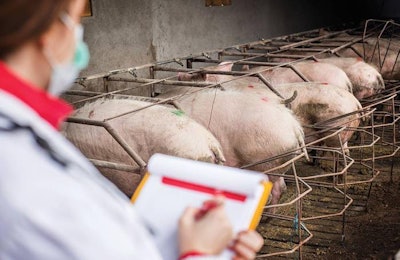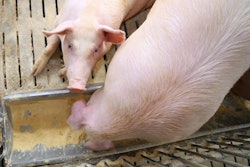
In Sichuan province, the African swine fever virus has been detected in a group of domestic pigs at a highway checkpoint.
At a checkpoint on a highway in the Luzhou region of China’s Sichuan province, a group of 435 pigs were found to be infected with African swine fever (ASF). Fifteen of the animals died, and the rest were destroyed, according to the latest agriculture ministry report to the World Organisation for Animal Health (OIE).
The most recent cases of ASF reported in the province were in July, at a farm with about 100 pigs.
Indirect impacts of ASF outbreaks being felt in China
China’s chicken farmers are now feeling the squeeze, as the indirect effects of ASF begin to impact the country’s animal protein sector generally.
Many of the country’s pig farmers whose herds were lost to ASF have switched to rearing chickens. While retail prices have risen by as much as 24% over the past few months, farmers are receiving less for their birds due to the oversupply in the market, reports South China Morning Post. One former pig farmer put his life savings into chickens, only to make a loss on every bird he rears.
Several of China’s large pork companies are reported to be investing in smaller-scale pig production. With financial support from the government, 15 companies have already committed to investments that will result in 22 million hogs annually, as well as helping to alleviate rural poverty.
South Korea’s ASF total rises to 53 wild boar
Globally, investigations of suspected cases of ASF and official reporting of any new cases have likely been delayed over the festive period.
Over the past two weeks, the number of wild boar infected with the ASF in South Korea has risen to 53, according to the Yonhap news agency. This is an increase of seven animals over the past two weeks.
The latest case was an animal found dead in the central border county of Cheorwan in Gangwon province, around 90 kilometers north of the capital, Seoul.
The most recent outbreak among South Korea’s domestic pigs was at a farm in the Paju region of Gyeonggi province in early October. Yonhap reports that more than 153,000 pigs have been culled since the first ASF outbreak in mid-September.
South Korea’s agriculture ministry has reported a further five cases of ASF in wild boar to the OIE over the past two weeks. All were found December 16-25 in Gyeonggi, a province that borders North Korea. Three of the animals were found in Yeoncheon county, and the others in the Paju city region.
More ASF cases in Russia’s Far East
Of the five most recent outbreaks of ASF confirmed in Russia’s Far East federal district, four were in wild boar, with 10 animals affected. Two were found in Yevreyskaya (Jewish Autonomous Oblast), and the others in Primorsky krai.
The outbreak in domestic pigs hit a backyard herd of seven animals in the Primorsky krai district of Khorolsky.
ASF fears grow in Indonesia
Authorities on Bali have denied that ASF has entered the island. However according to 7 News of Australia, procedures have been tightened up to prevent the spread of the disease from other parts of Indonesia. Among these measures is a ban on the feeding of all food scraps to domestic pigs, which was a common practice on Bali.
Bali is a popular vacation destination for global tourists, particularly for Australians. Australian authorities have stepped up screening of all passengers arriving from Indonesia.
Only recently has ASF been officially confirmed in Indonesia. At the time, more than 28,000 pigs in the North Sumatra region were reported to have died since the first cases in September 2019.
According to The Jakarta Post last week, the death toll from ASF in North Sumatra had risen to 29,200 pigs. The government is providing financial assistance for the safe burial of all these animals. It has also corrected earlier reports that identified the cause of death as classical swine fever, and officially confirmed the presence of ASF in the region.
Indonesia is the 12th country in Asia (including Russia’s Far East region) to have confirmed outbreaks of the disease during 2019.
View our continuing coverage of the African swine fever outbreak.

















